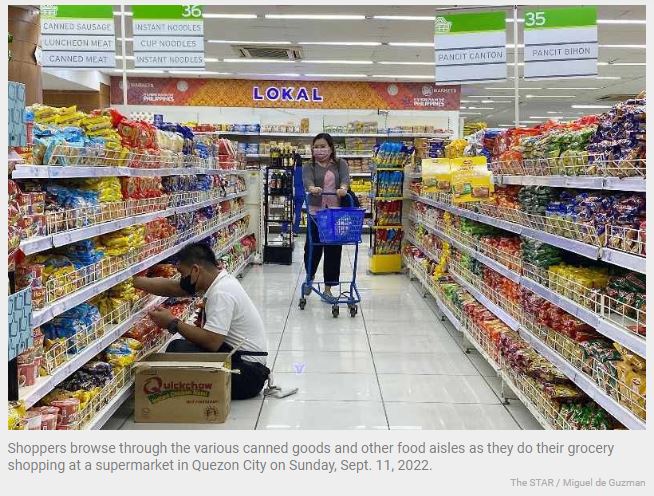Philippines: Government says painfully high inflation to temper growth in 2023
MANILA, Philippines — The Marcos Jr. administration projected on Tuesday that the Philippines’ economic growth will be tempered next year, especially since they expect the country will be at the mercy of global headwinds that stoked inflation.
This is what the public should expect, according to Socioeconomic Planning Secretary Arsenio Balisacan, since global headwinds led by a projected recession in developed economies could come into full view in 2023.
“Our analysis show sustained that sustained increases in inflation in 2022 and 2023 will cause a slowdown in the economic growth translating into gross domestic product levels lower by 0.6% in 2023 than the expected level had there been no sustained inflation shock,” Balisacan read from a prepared statement in a Palace briefing on Tuesday.
As it is, the Philippines is chocked in the middle of its economic recovery from the pandemic fallout. Global headwinds, which include persisting supply chain disruptions and expensive fuel, gave rise to inflation levels last seen in 2018, when rice prices were skyrocketing.
Balisacan, who is the chief of the National Economic and Development Authority, noted that once the country’s trading partners fall into recession, this would result in a weaker demand for the Philippines’ exports, investments and tourism.
That said, the Bangko Sentral ng Pilipinas’ flurry of interest rate hikes to cool down inflation could inevitably slow down the country’s growth prospects. Domini Velasquez, chief economist at China Banking Corp., explained the impact of the rate hikes, wherein interest rates currently stood at 4.25%, will force the hand of businesses.
“The effects of BSP tightening will be more pronounced next year as businesses grapple with higher interest rates. Many would probably be putting off expansion activities as financing gets more expensive,” she said in a Viber message.
As it is, the central bank projects that rate hikes take around 6-18 months before it seeps into the economy.
Nicholas Antonio Mapa, senior economist at ING Bank in Manila, said he was unsure whether Balisacan’s projection already penciled in rising inflation and the rate hikes.
“In any case, higher inflation will definitely dampen consumption as it shaves off purchasing power. Meanwhile higher borrowing costs will also impact growth by capping expected gains for capital formation,” he said in a Viber message.
Inflation has yet to peak, as state statisticians are wary that price growth in October could accelerate considering the developments here and abroad.
“The silver lining is that the economy is in much better shape in 2022 vs 2021, when the Philippines was still in a recession,” Mapa added.
These economists project the domestic economy to miss the Marcos Jr. administration’s lofty growth aspirations. For Mapa, GDP could slow down to 5.9% this year and tumble further to 4.4% in 2023. Velasquez expects economic growth next year to fall between the range of 5.5-6%, especially since consumer demand could cool as inflation is forcing Filipinos to dip into their savings.
The Marcos Jr. administration set a target of 6.5-7.5% economic growth until 2028, all before central banks everywhere started hike interest rates in past months.
Despite this, Leonardo Lanzona, an economist at Ateneo De Manila University, noted that the country could still address the impacts from this expected slowdown. NEDA said the national government will continue its subsidy program extended to the country’s poorest sectors such as fisheries and agriculture.
“Other countries have been able to manage their currencies and productivity better than the Philippines. Crucial in this recovery program is a strong agricultural sector which continues to be inefficient,” he said.
“If the idea is not to hamper our medium term goals as we address the short term challenges, we should focus on the productivity of the marginalized sectors. This can be done through an effective job creation program,” Lanzona added.
Source: https://www.philstar.com/business/2022/10/18/2217583/government-says-painfully-high-inflation-temper-growth-2023


 English
English




